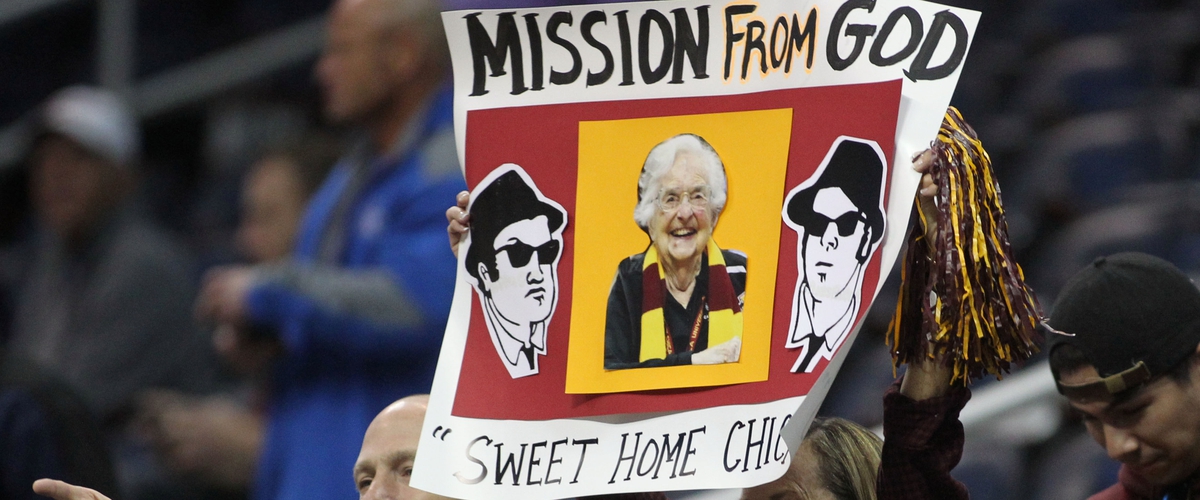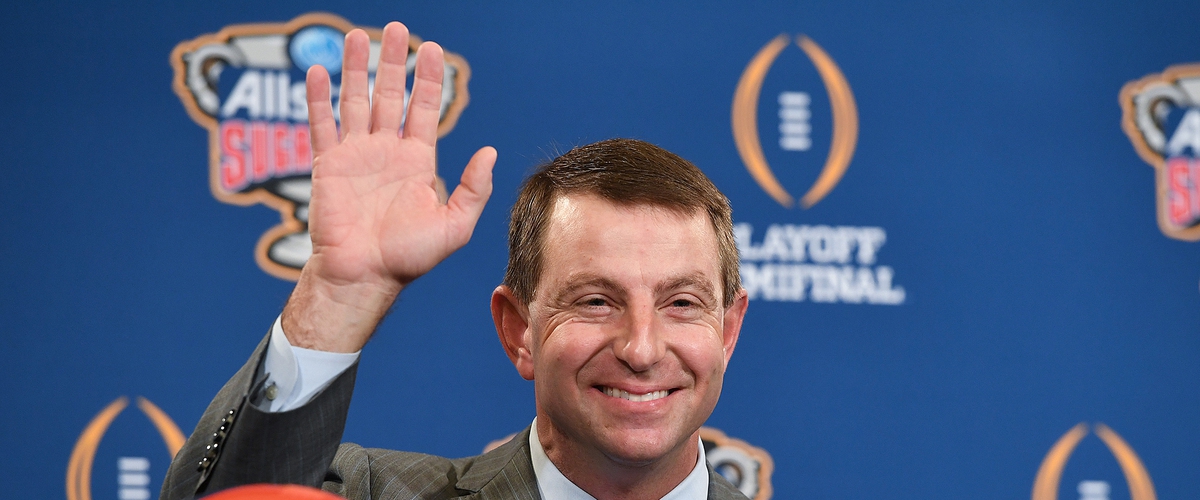Can Loyola Chicago Save The NCAA?

This year's NCAA basketball tournament (aptly named March Madness) has been a wild ride.
We saw the first ever 16 seed knock off the number one overall seed in the tournament. We've watch Michigan find themselves.
We had the privilege of seeing one team, Nevada, decide they only wanted to play the final six minutes of each game. The strategy actually worked twice, and almost a third time.
The final four features a matchup between Kansas and Villanova that's sure to be an instant classic, along with Michigan taking on a Loyola (Chi) Ramblers team that shouldn't be here.
The last statement isn't fair. The Ramblers should be here, but they weren't expected to be. They are the comedic hero found in generic 90's action movies: they aren't the hero you want, but the one you need. While you, dear reader, might not need a hero, the NCAA does. Luckily for them, there's some good news:
Those pesky Ramblers and their beloved Sister Jean might be the only thing stopping collegiate sports from losing its soul.
The NCAA's Fall From Grace
College athletics, in their purest form, represents the idealism of competition. Athletes from all over the globe come together to compete against each other, learning the values of hard work, fair play, and putting aside ego to achieve a team goal.
Money was barred from the sport because the originators of college athletics realized that it would corrupt the institutions. It was pure, raw, and emotional.
Then something happened.
It didn't take long before schools realized that they could fill stadiums that make most NFL owners jealous. Lincoln Financial Field, home of the Superbowl champion Philadelphia Eagles, has a standing room capacity of 69,000.
If the University of Alabama or Auburn ever averaged a paltry 69,000 attendance in their stadiums, there would be panic in the streets.
The amount of money made by institutions by college football and basketball makes it impossible to hold true to the ideal of fair play. Bigger schools, such as Alabama, get the top athletes, biggest TV deals, and richest sponsorships. This extra money, attained on the backs of the athletes that actually play the game, allow schools like Clemson to pay head coach Dabo Swinney 5 million a year.
Remember that in a few minutes.
Meanwhile, small schools fight for financial scraps. Their players have less resources, from training staff to financial assistance. They can't recruit the top talent, so they end up playing the role of schedule fillers. A small school that agrees to play Clemson or Alabama makes a king's ransom, even though they know that they are playing to lose.
This disparity leads to the top programs staying on top and distancing themselves from mid-majors. Alabama and Clemson have been in the national title picture for the better part of a decade while teams from non-power conferences are forced to accept their place as "also-rans".
Starving Kids, Happy Coaches
Meanwhile, coaches and admin get rich while the students risking their health get nothing.
Shabazz Napier, a basketball player for UConn, caused a media stir when he admitted that he and many other basketball players go to bed hungry each night.
Meanwhile, Kevin Ollie, Napier's head coach, received a salary of 1.25 million, plus a $33,000 bonus for reaching the final four.
Dabo Swinney, head coach of Clemson football, makes 5 million a year. And just to set the record straight, he doesn't think college kids should get paid because college athletics are "pure". In all fairness, it's easy to say "let them eat cake" when you're eating steak and sirloin every night. What a brave stance from the Dabster.

He's so folksy though!
Since college kids are forced to go into the college system before playing in the NFL or NBA, colleges get rich while them and their families suffer. Many athletes, looking for ways to get paid for their work, began going overseas for a year and then declaring for the draft.
Colleges began to fear that they would lose their prison labor and responded by paying top athletes under the table.
Wait.......did I just call athletes prison labor? I can already see readers getting triggered.
Those aren't my words. Those are the words of the NCAA. This is the logic they used to defend themselves in a lawsuit by players that want to, y'know, actually get some of the money they earn. The NCAA views the kids playing sports for them as prison labor.
Let that sink in for a moment.
Other top-tier athletes are paid thousands under the table by programs desperate to keep the money train rolling. Numerous top programs are currently under investigation by the FBI for violating rules. Of course the NCAA is silent on this, because they are in the middle of their championship basketball tournament: the one that they make over a billion dollars on from television and advertising fees.
In summary, the NCAA makes billions of dollars, coaches and administrators make millions, and the athletes doing the work are referred to as prison labor while they receive no payment. To top it all off, the FBI is investigating the entire system, threatening to bring down the sport's biggest names.
The athletes meanwhile get free classes and access to the best protein powder billions of dollars can buy. Seems fair, right?
Eventually, the federal investigation and the lawsuit by former players will bring out damning information that's going to force fans to ask themselves hard questions.
If you think it's immoral for athletes to go to bed hungry while their schools rake in millions, can you continue to watch?
Ponder this question. Let it sit. We'll come back to it shortly.
An Unlikely Savior Emerges
I'll be the first to admit: I always pull for the underdogs.
College basketball is always at it's best when the dominant powers get brought down to Earth. Actually, everything is. It's the basis for world literature: something or someone becomes to powerful, only to be checked by an unlikely hero. Pride and the downfall that inevitably comes after it never fails to produce an amazing plot. Look at Greek and Roman mythology: One of the first stories I was taught as a child is the story of Icarus and his doomed suit of feathers.
Icarus, meet son. Kansas, Michigan, and Xavier, meet Loyola Chicago.
With the year that the NCAA has had, this is really the only way the story could end. Three perennial powers face off against a team no one thought could go this far. A team built on the ideals that the NCAA espoused so many years ago: teamwork, hard work, and a lack of ego.
The only way NCAA basketball comes out of this year unscathed is the traditional powers being defeated by the school you didn't know existed until March. The old guard, the ones that corrupted this thing of beauty die in a blaze of glory.
It might seem like it's a stretch to view the Final Four in such dramatic terms, but it's reality.
Remember that question from earlier?
If you think it's immoral for athletes to go to bed hungry while their schools rake in millions, can you continue to watch?
The answer in a morally consistent world is a resounding no. The system, as currently constructed, favors a small minority of schools, making them billions of dollars while college kids go hungry. To take part in that system by giving them one more viewer to pitch to advertisers isn't just wrong.
It's an act of complicity.
You become what you despise. You become the reason that these kids work for nothing. No amount of tide-pod consumption can wash that out of your system.
If Loyola Chicago were to pull off the unthinkable, however, it's a brand new game. All of a sudden, the old guard and their system of dominance comes to an end. A school without the resources, money, and paid players rises to the top. The system doesn't necessarily fix itself over-night, but it does prove that even with all of the checks and balances in place to guarantee teams like the Ramblers can't succeed, the original principles of college basketball live on.
The act of watching isn't complicity then. It's an act of rebellion.
It's watching a mob of 13 walk into the middle of Rome and burn it to the ground.
That's something I can get into. Enjoy your flight, Icarus.
Side note: I would love to make a prediction here, but I also predicted that the Seahawks would be okay. That blew up in my face for obvious reasons. So instead of predicting, I'll just hope Loyola Chicago destroys the NCAA on their biggest stage.
Give em hell, kids.